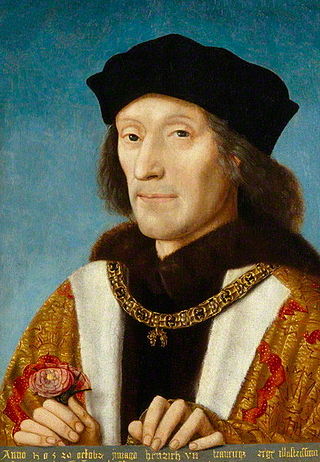Henry VII of England
King of England, from 1485 to 1509 From Wikipedia, the free encyclopedia
Henry VII or Henry Tudor (28 January 1457–21 April 1509) was King of England from 1485 to 1509. He founded the Tudor dynasty by winning the battle of Bosworth Field in 1485. His son became king Henry VIII of England.
| Henry VII Tudor | |||||
|---|---|---|---|---|---|
| King of England; Lord of Ireland | |||||
 Henry holding a rose and wearing the collar of the Order of the Golden Fleece, painted by an unknown Netherlandish artist, 1505. | |||||
| King of England | |||||
| Reign | 23 August 1485 – 21 April 1509 (23 years, 241 days) | ||||
| Coronation | 30 October 1485 | ||||
| Predecessor | Richard III | ||||
| Successor | Henry VIII | ||||
| Regent | Henry Tudor, Prince of Wales (1507 – 1509) | ||||
| 2nd Earl of Richmond (disputed) | |||||
| Predecessor | Edmund Tudor, 1st Earl | ||||
| Born | 28 January 1457 Pembroke Castle, Wales | ||||
| Died | 21 April 1509 (aged 52) Richmond Palace, England | ||||
| Burial | |||||
| Spouse | Elizabeth of York | ||||
| Issue among others | Arthur, Prince of Wales Margaret, Queen of Scots Henry VIII Mary, Queen of France Catherine Tudor | ||||
| |||||
| House | House of Tudor | ||||
| Father | Edmund Tudor, 1st Earl of Richmond | ||||
| Mother | Lady Margaret Beaufort | ||||
Biography
Henry VII was born in 1457 to Edmund Tudor and Margaret Beaufort. His father died thirteen days before he was born, leaving his 13-year-old mother as his only parent. After Henry's birth, he spent a lot of time with his uncle Jasper Tudor. Jasper took Henry to France, where he spent most of his youth. Henry had a claim to the throne of England, but it was not a very good one, and he had to wait a long time for a chance to take the throne.
In 1483, a new king came to the throne in England, called Richard III. King Richard was not popular with everyone. Some thought he had stolen the throne from his young nephews and had killed them. This gave Henry the chance he had been waiting for. With help from the French, he raised an army. They landed at Dale in Pembrokeshire, close to where Henry had been born, so he was able to gather more supporters on the way.
The Wars of the Roses (1455–1485) had been going on for years. They were fought over the throne of England between supporters of the House of Lancaster and supporters of the House of York. Both houses were branches of the Plantagenet royal house, tracing their descent from King Edward III.
King Henry VI and his family the House of Lancaster fought against their enemies for many years. The wars finally came to an end when King Henry VII of England came to the throne in 1485.
On 22 August 1485, Henry's army defeated Richard III's army at the Battle of Bosworth Field. When Richard III died in this battle, Henry VII became king. Other people also had a claim on the throne, and Henry did his best to stop them from taking it from him, either by executing them, putting them in prison, or trying to make friends of them, as he did with the Earl of Lincoln. Another step he took was to marry Elizabeth of York, the niece of King Richard III, who would herself have been the heir to the throne if she had not been a girl.
There were also people who pretended to be long-lost members of the royal family, so that they could try to take the throne. One of these was a little boy called Lambert Simnel, who looked very like Edward, Earl of Warwick. The real Earl of Warwick was Henry's prisoner, but this did not stop other people from believing that Lambert was him. The Earl of Lincoln rebelled against King Henry and raised an army to make Lambert king, thinking that he himself could rule the country. There was a battle, and the Earl of Lincoln was killed. Lambert Simnel was captured, but, because he was only a child, Henry spared his life and he became a royal servant.
Children
See also: List Of Henry VII’s Children
Henry married Elizabeth of York, and by this action put an end to the Wars of the Roses. They had seven children, but only four survived infancy:
- Arthur Tudor (19/20 September 1486–2 April 1502)
- Margaret Tudor (28 November 1489–18 October 1541)
- Henry VIII (28 June 1491–28 January 1547)
- Elizabeth Tudor (2 July 1492-14 September 1495)
- Mary Tudor (18 March 1496–28 June 1533)
- Edmund Tudor (21 February 1499–19 June 1500)(died young)
- Catherine Tudor (2 February-18 February 1503) (died young)
Henry VII increased taxes so future kings would have enough money. People disliked that.
Death
Henry VII died of tuberculosis in 1509 and was buried in Westminster Abbey. He was succeeded by his son, Henry VIII on 21 April 1509.
Wikiwand - on
Seamless Wikipedia browsing. On steroids.
